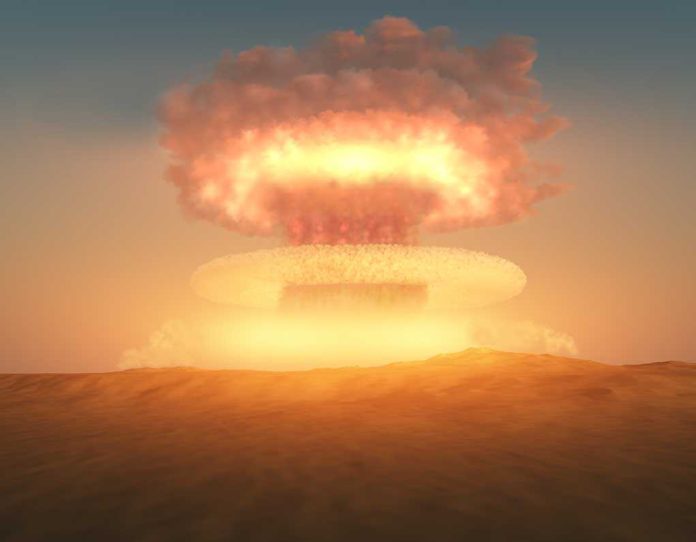
Russian nuclear threats resurface after President Trump’s forceful comments on U.S. nuclear testing, triggering global alarm and raising constitutional questions at home.
Story Highlights
- Putin signals possible return to Russian nuclear testing in direct response to President Trump’s U.S. testing rhetoric.
- Renewed nuclear brinkmanship threatens global security and U.S. strategic interests.
- Conservative Americans voice concerns over constitutional checks, military readiness, and the risks of international overreach.
- Calls emerge for robust defense policies that prioritize American sovereignty and protect against foreign intimidation.
Putin Responds Aggressively to Trump’s Nuclear Testing Comments
Russian President Vladimir Putin convened his security council after President Trump made assertive remarks about the possibility of resuming U.S. nuclear weapons testing. Putin declared that Russia would consider resuming its own nuclear tests should the United States proceed. This announcement, coming amidst heightened global tensions, marks a sharp escalation in rhetoric and reintroduces the specter of Cold War–style nuclear posturing. Many conservatives see this as validation of longstanding concerns about adversarial powers exploiting perceived American weakness under prior administrations.
Nuclear Escalation Raises National Security and Constitutional Concerns
Putin’s threat to resume nuclear testing is not merely bluster; it directly challenges America’s strategic deterrence and the credibility of U.S. defense commitments. For many Americans, especially veterans and those who value a strong military, the episode underscores the necessity of robust national defense policies that assert American strength without ceding ground to hostile powers. There is renewed debate about the constitutional limits of executive authority in matters of war and peace, with some urging Congress to reassert its role in overseeing foreign policy and military decisions to prevent any potential overreach.
Global Fallout and the Risks of International Overreach
The possibility of a new nuclear arms race has alarmed allies and adversaries alike. European leaders have called for restraint, while U.S. defense experts warn that unchecked escalation could erode American security and global stability. Conservative analysts argue that the United States must prioritize sovereignty and avoid entanglements that do not serve the national interest. The episode also highlights the danger of foreign regimes using provocative rhetoric to test American resolve, reinforcing the need for policies that put America first and defend constitutional principles against globalist pressures.
Constitutional Values and the Need for Strong Leadership
For the conservative base, this episode is a stark reminder of the stakes in American foreign policy. Many recall years of what they perceive as leftist appeasement and globalism, which they believe emboldened adversaries. The Trump administration’s assertive posture is viewed as a corrective—reaffirming American sovereignty, upholding the Constitution, and refusing to bow to intimidation. As threats mount abroad, conservatives call for vigilance at home: defending Second Amendment rights, securing borders, and ensuring that no foreign or domestic force erodes the values that define the nation.



